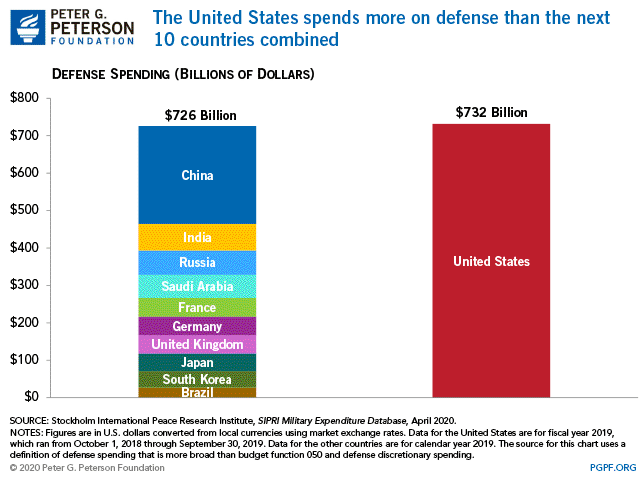The Biden administration has brought a refreshing agenda of decency and progressive change to Washington, but its proposals for military spending are disappointing. The recently announced federal budget for fiscal year 2022 proposes a whopping $753 billion for the Pentagon, a 1.6 per cent increase over already inflated spending levels. The military budget continues to consume approximately half of all discretionary federal spending. It remains a “theft from the poor” as I wrote recently on this blog.
In March, fifty members of the House of Representatives led by Reps. Barbara Lee (D-CA) and Mark Pocan (D-WI) urged the administration to slash unneeded military programs and devote the funds instead to serving human needs. “Hundreds of billions of dollars now directed to the military would have greater return if invested in diplomacy, humanitarian aid, global public health, sustainability initiatives, and basic research,” their letter stated.
Arms spending in the US is larger than that of the next ten countries combined, including both China and Russia, as the chart below illustrates. Most of the top ten military powers are US allies. According to the latest figures from the Stockholm Peace Research Institute, released in April, the US military budget is three times larger than that of China and twelve times greater than Russia’s. Even after spending cuts, the United States would remain by far the greatest military power in the world, capable of defending against any conceivable military threat.

The best strategy for cutting the Pentagon budget is not to take a meat ax to the military but to focus on major weapons systems that are unnecessary and wasteful. The strategic goal should be to reduce dangers by ending military interventions and eliminating provocative programs that increase the risk of reciprocal buildups or aggressive responses by competitors.
This reduction should be combined with a reformulation of US national security strategy: abandoning the pretense that Washington has the ability and authority to act as the world’s police force, and focusing instead on cooperative multilateral means of resolving international disputes and ameliorating the social, economic, and political conditions that give rise to conflict. If the United States wishes to protect global security and defend human rights, it should do so in accordance with international law and the structures and policies of the United Nations. US military interventions have often led to greater war and violence, not less, as the debacles in Iraq and Libya attest.
The inconvenient truth of US policy is that much of what passes for defense actually has little to do with defending the nation. The Pentagon focuses on projecting imperial power abroad, sustaining a network of some 750 US bases and military outposts scattered across the globe, and fighting a forever war of US bombing and intervention in multiple countries.
The arms budget is larded with huge pork-barrel weapons systems that in some cases do not work (strategic missile defense) or have become vastly overpriced boondoggles (the F-35 aircraft). These programs are sustained because they deliver lucrative contracts and profits to the powerful arms manufacturers who design and build them.
The best strategy for cutting the Pentagon budget is to focus on major weapons systems that are unnecessary and wasteful.
The Center for International Policy and other organizations have offered sensible proposals for eliminating unnecessary and wasteful military programs. The proposed changes can be made without jeopardizing US defenses, and in fact would enhance US and global security by allowing greater investment in diplomacy and human-centered development programs to address the root causes of conflict.
The following programs are among the prime candidates for removal:
- The rebuilding of the land-based intercontinental ballistic missile system (ICBM), more than 600 new missiles that will significantly upgrade the US ability to launch nuclear weapons. The estimated price tag is $100 billion. Former Defense Secretary William Perry has argued for eliminating land-based ICBMs and relying instead on submarine-based missiles to maintain a balance of strategic deterrence as the US and Russia reduce their nuclear stockpiles toward zero.
- The production of new air-launched and ship-launched nuclear-armed cruise missiles, along with new nuclear warheads—programs that will cost tens of billions of dollars and likely prompt reciprocal nuclear developments by Russia.
- The buildup of naval and other military forces in the West Pacific. The administration’s budget plan describes China as the “top threat” and calls for leveraging the Pacific Deterrence Initiative, a $27 billion program of defensive systems and expanded military capability in the region. The Pentagon submitted a proposal last year for significantly increasing Navy shipbuilding costs to confront China, a program that would add tens of billions of dollars to the military budget in coming years and likely prompt further militarization from Beijing.
Eliminating these and other dangerous and superfluous programs would reduce arms spending by more than $100 billion annually, although savings would be less initially as contract payments are concluded and adjustment assistance is provided for workers and communities affected by lower military spending. Over the years, however, a peace dividend would steadily accumulate, providing resources to fund infrastructure development and other domestic spending priorities. Demilitarizing US international policy would free up resources for human-centered development and peacebuilding programs that address the root causes of violence and instability.
Support the troops
Pentagon spending cuts should not come at the expense of men and women in the military. As the United States curtails unnecessary weapons systems, it can and should continue to support the troops by providing adequate compensation and full benefits for all service members and veterans, including guarantees of lifetime care for veterans afflicted with post-traumatic stress and other ailments of war.
Advocating for Pentagon budget cuts is an uphill battle in Washington. The mere mention of lower military spending tends to unleash legions of arms industry lobbyists, scurrying to Capitol Hill to remind legislators that cuts in arms spending would mean the loss of jobs in their home districts. Millions of people depend upon the Pentagon budget for their livelihoods, and until alternative opportunities are found for these workers and their communities, pressures against spending cuts will be enormous, from Democrats as well as Republicans.
A creative solution would be for the Biden administration to include support for economic conversion in its infrastructure jobs program. The goal would be to redirect some of the scientific and technological resources that are now devoted to weapons building to the development of alternative energy, modernized transportation systems, and other needed domestic investments.
Turn away from militarism
Rev. Dr. Martin Luther King, Jr. famously warned against the giant triplets of evil—racism, economic exploitation, and militarism. The administration has taken steps toward starting to address the first two, but it has yet to consider the third. The fulfillment of a progressive agenda will depend on ending dependence on the war economy. True peace is more than the absence of war, King argued, it is the presence of justice, a society that nurtures human flourishing and the dignity of all persons and communities. To realize this integrated vision of human security will require a radical reimagining of the US role in the world and reordering of national budget priorities.
David Cortright is the director of the Global Policy Initiative, special advisor for policy studies, and professor emeritus of the practice at the Keough School of Global Affairs at the University of Notre Dame.
This article is part of a series of blog posts published by the Keough School of Global Affairs. Dignity and Development provides in-depth analysis of global challenges through the lens of integral human development.



